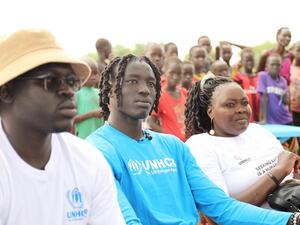Ukraine: Humanitarian needs rise as internal displacement tops 117,000 people
Ukraine: Humanitarian needs rise as internal displacement tops 117,000 people
As the situation in eastern Ukraine continues to deteriorate, the UN refugee agency estimates that over 117,000 people are currently displaced inside Ukraine. In the past seven days more than 6,200 people have been forced from their homes. As of 1 August, an estimated 168,000 people had also crossed into Russia so far this year.
The number of people displaced from the Luhansk and Donetsk regions has risen sharply since early June from 2,600 to 102,600 in early August. People from eastern Ukraine now make up 87 per cent of the total displaced population in Ukraine; those from Crimea now number some 15,200 people.
People are fleeing eastern Ukraine with limited belongings and increasing difficulties, including access to banking services. Basic services and infrastructure have been heavily affected by the increased violence, with scarcity of drinking water now becoming increasingly common. Many houses and buildings have been partially or totally destroyed in the areas affected by conflict in Donetsk and Luhansk regions.
UNHCR is also seeing a mixed picture of displacement with a significant increase of people fleeing violence around Horlivka, Donetsk and Luhansk as well as a substantial numbers of returns to areas where the Ukrainian government has regained control.
According to local authorities, some 4,000 persons have reportedly returned from Kharkiv region to Slavyansk and Kramatorsk during last seven days. Some 20,000 people have reportedly returned to Slavyansk since 5 July.
Those displaced cite security concerns, including the risk of being caught in crossfire, as the main reason for leaving their homes. Some people also expressed fears of persecution for their political views, ethnicity or forcible recruitment by government or anti-government forces. Some are reporting having experienced or heard of incidents of abduction, extortion and harassment in their neighbourhoods. Other reasons people cited for being forced to flee included damage to their homes, lack of services and damage to basic infrastructure in the region.
UNHCR calls for the establishment by the Ukrainian government of a central registration system of internally displaced people. The current lack of a systematic and uniform system hampers the coordination and implementation of relief efforts. This is also important as the Ukrainian authorities make their preparations for winter. Most of the current shelters in use are not suitable for the cold winter months.
UNHCR continues to support government and civic society in their response to the displacement, as well as provides aid directly to the most vulnerable. UNHCR has delivered hygiene items and kitchen appliances to some 15,000 returnees in Slavyansk, Donetsk region. In June and July three shipments of hygienic items, food, mattresses and bed linens were delivered to Sviatohirsk and some 5,000 displaced persons received relief items in Krasniy Lyman.
Most internally displaced people are hosted by friends, families or are renting accommodation. UNHCR has started a cash assistance programme to support more than 700 internally displaced people in Lviv and Vinnytsia regions.
Last week UNHCR signed a cooperation agreement with Donetsk regional authorities to open a field office in Mariupol to support government officials and coordinate the distribution of aid to the most vulnerable internally displaced people. The first delivery of hygiene and food items took place on 1 August in the town of Yalta, in Pervomaisk district; another shipment is planned in the coming days for Pryazovskiy district, in the south of Donetsk region, which hosts more than 20,000 displaced people.
Most Ukrainians leaving their country are not applying for refugee status. They often seek other legal status. Some fear applying for refugee status will lead to complications and they consider the alternatives available a better temporary solution.
According to Russian authorities, from 1 January to 1 August, 168,677 people applied to the Federal Migration Service. These breakdown as 6,347 for refugee status, 48,914 for temporary asylum, 28,134 for citizenship, 59,858 for temporary residence, 19,943 for residence permits and 5,481 under the programme of resettlement of compatriots.
A larger number of Ukrainians are arriving and staying in Russia under the visa-free regime. According to the Russian authorities around 730,000 Ukrainians arrived since the beginning of the conflict, this includes the 168,677 figure. Around 80% of Ukrainians are staying in border areas, while others are moving to stay with friends or relatives in other parts of the country. Over 585 temporary accommodation facilities are hosting 42,486 people. The Russian authorities have adopted several regulations to facilitate the temporary stay of Ukrainians arriving on its territory.
From January through June of this year, some 2,700 Ukrainians applied for international protection across the European Union.
For more information on this topic, please contact:
- In Kiev, Nina Sorokopud on mobile +380 50 310 1767
- In Moscow, Galina Negrustueva on mobile +7 903 721 7560
- In Geneva, Dan McNorton on mobile +41 79 217 3011








